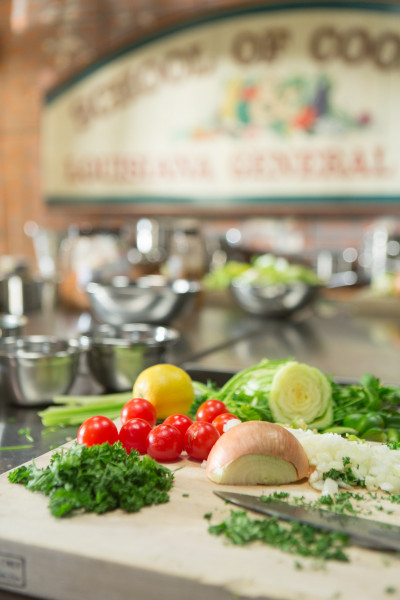Blog
Cajun French Dictionary

Pop quiz time! How many of the words do you know below?
While you are traveling in the state of Louisana, you might hear some terms that you are not used to hearing. You are not going crazy; you are just speaking to a Cajun.
In the mid 18th Century, French colonists settled in the Canadian province of Nova Scotia, just above the tip of what is now Maine. These settlers, known as the Acadians, were soon exiled by the British and found refuge in Southern Louisiana, with its already-strong French heritage. The Acadians eventually became known as "Cajuns" and developed their distinct lifestyle and dialect, now known as Cajun French.
So go ahead, enjoy this little lagniappe (see definition below). Learn more about Cajun and Creole heritage in our entertaining cooking classes!
Allons (ah-lohn) - Let’s go!
Andouille (ahn-do-wee) - a spicy sausage made with pork, typically used in gumbos and other Cajun dishes.
Bayou (bye-you) - a slow moving stream.
Beignet (bin-yay) - a fried French donut covered in powdered sugar. Typically, beignets come in the classic square shape, but some restaurants in Baton Rouge, like Coffee Call, will have them in long, thin strips called Beignet Fingers.
Bon Ami (bon ah-mee) - a good friend.
Boucherie - A boucherie is a historical term for a communal hog butchering party. The community would gather to butcher one hog and make traditional pork-based products such as sausage, boudin, hoghead cheese, and tasso for all to share.
Boudin (boo-dan) - a combination of cooked rice, pork, onions, green peppers, and seasonings. The mixture is put into a meat grinder before being stuffed into a sausage casing. It is then steamed or heated. Boudin balls are amazing too, which is just Boudin molded into a ball and then fried.
Bourre (boo-ray) - French for "stuffed”, it is also the name of a Cajun card game.
Cassoulet (cass-ou-lay) - a hearty French bean stew typically made with white beans and sausages, along with pork, lamb or other meat.
Cher (shaa) - Cajun and Creole slang, derived from the French. A term of affection meaning darling, dear, or sweetheart. When used as an adjective, it is to describe something sweet or cute.
Couyon (coo-yawn) - used to describe a foolish person.
Courtbouillon (pronounced “coo-be-yahn): In Louisiana courtbouillon is a thick, rich, aromatic Cajun fish stew, usually made with catfish. It’s completely different from the Court-bouillon of the French, which means a liquor or stock that’s used as a cooking liquid. The Creole version would use a tomato-based stew and whole redfish.
Étouffée (ay too fay) - a dish common in Cajun and Creole cuisine that consists of some type of smothered seafood stew served over rice.
Fais Do Do (fay doh doh) - the French way to say “go to sleep,” and oddly enough, also a term for a Cajun dance party, often held on Saturdays or Sundays.
Fifolet (fee foo lay) - Cajun Folklore. In Baton Rouge, also the name of a popular Halloween Festival.
Filé (fee-lay) - ground Sassafras leaves used to thicken and flavor gumbo.
Gris-gris (gree-gree) - to put a curse on someone, most commonly used in discussions of voodoo or black magic.
Gumbo (gum-boe) - a thick, robust, roux-based soup prepared with seafood or game & often thickened with okra or filé.
Jambalaya (jum-bo-lie-yah) - a rice dish with any combination of beef, pork, fowl, smoked sausage, ham, or seafood, as well as celery and green peppers. In the traditional Creole recipe, tomatoes are added.
Joie de vivre (Jhwa da veev) - French translation of “the joy of living.”
Lagniappe (lan-yap) - meaning “a little extra”
Laissez les Bon Temps Roulez (lay-zay lay bon ton rule – ay) – Cajun French for “Let the good times roll!”
Maque Choux (mock-shoo) - corn stewed down with tomato, peppers, caramelized onion and spices. Meat or seafood may be added.
Mardi Gras (mardi graw) - French for “Fat Tuesday,” Mardi Gras is centered around the Catholic traditional holidays, Fat Tuesday and Ash Wednesday leading up to Easter. Usually occurs in late January, February and sometimes even March. For Louisianians, Mardi Gras is the biggest festival of the year.
Petite (pe-teet) - small.
Po-Boy - a sandwich that is always made with French bread, po-boys can be stuffed with fried oysters, shrimp, fish, crawfish, meatballs, smoked sausage and more. Gets its name from a historical sandwich costing only 5 cents for “poor boys.”
Pirogue (pronounced pee-row) A pirogue is a Cajun canoe.
Roux (rue) - the oh-so-important base of gumbos or stews. It’s a slow-cooked mixture of flour and oil that adds flavor to the dish, but everyone’s grandma has their own special technique.
Sauce Piquante (saws-pee-kawnt) – means “spicy sauce” usually used in a spicy dish or stew.
Tasso- Tasso is a specialty of south Louisiana, a spicy version of smoked ham made from the shoulder butt part of a pig.
Zydeco (zi-de-co) – a style of music combining traditional Creole and Cajun music with R&B and African Blues.